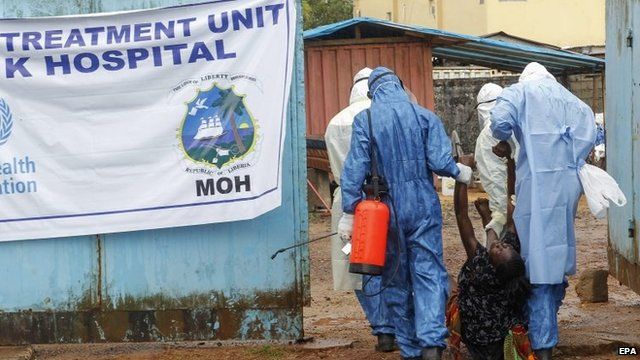Ebola 'threat to world security'- UN Security Council
- Published

The UN Security Council has declared the outbreak of the Ebola virus in West Africa a "threat to international peace and security".
The council unanimously adopted a resolution calling on states to provide more resources to combat the outbreak.
UN Secretary General Ban Ki-moon warned an emergency meeting of the council that the number of Ebola infections was doubling every three weeks.
More than 2,600 people have now died in the worst Ebola outbreak on record.
Cases doubling
Mr Ban said the "gravity and scale of the situation now require a level of international action unprecedented for a health emergency".
He announced the establishment of an "emergency UN mission" working with the World Health Organization (WHO) to combat the crisis, saying he would convene a "high-level meeting" next week.
The council heard that the international response had to be three times bigger than it was now to contain the crisis - the number of cases is doubling every two weeks in west Africa.
The resolution attracted 130 co-sponsors - a UN record - and calls on countries to provide urgent aid, such as medical staff and field hospitals.
The resolution also calls for travel bans imposed by some states to be lifted, saying the countries need to have access to aid instead of being isolated.
Council members heard that the international response would need to be 20 times greater than it was now, if the outbreak were to be controlled.
The Security Council has never previously met to confront a public health crisis, reports the BBC's Nick Bryant from New York.
It is only the second time that a public health issue has been addressed at the council, the first instance being HIV/Aids, our correspondent adds.
A doctor appearing via video link from Liberia warned that if the international community did not step up its response, "we would be wiped out".
Meanwhile officials in Guinea searching for a team of health workers and journalists who went missing while trying to raise awareness of Ebola have found several bodies.
A spokesman for Guinea's government said the bodies included those of three journalists in the team.
They went missing after being attacked on Tuesday in a village near the southern city of Nzerekore.
In Sierra Leone a three-day curfew or lockdown intended to stop the spread of the virus has come into effect.
The aim of the move is to keep people confined to their homes while health workers isolate new cases and prevent Ebola from spreading further.
Critics say the lockdown will destroy trust between doctors and the public.
The BBC takes a look at the scale of the challenge the Ebola outbreak presents to modern medicine
Ebola virus disease (EVD)
- Symptoms include high fever, bleeding and central nervous system damage
- Spread by body fluids, such as blood and saliva
- Current outbreak has mortality rate of about 55%
- Incubation period is two to 21 days
- There is no proven vaccine or cure